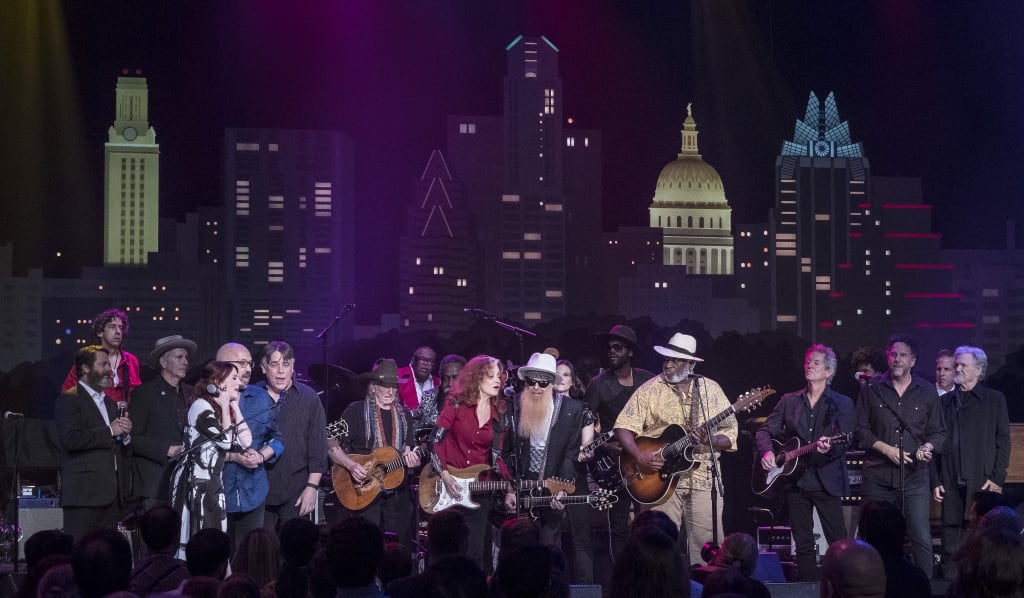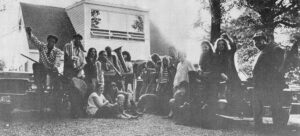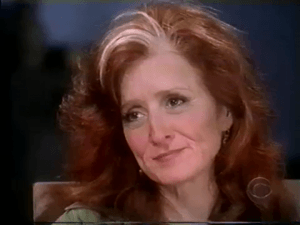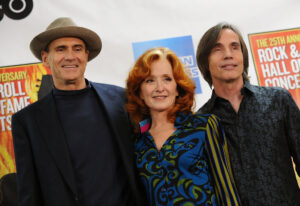

When the time came for Mavis Staples to formally induct Bonnie Raitt into the Austin City Limits Hall of Fame on Wednesday night at ACL Live, it was her late father, Staple Singers patriarch Pops Staples, who provided the best line of the night.
“My pops loved Bonnie,” Mavis beamed. “He used to so say, ‘She’s a little piece of leather but she’s well put together.’”
Such balance of toughness and composure has long marked the career of Raitt, who was the standout performer on a night filled with legends both living and departed. The long-running television show’s third annual Hall of Fame ceremony kicked off with the induction of songwriting great Kris Kristofferson by Rodney Crowell, proceeded through Raitt’s special moment and culminated with a celebration of B.B. King, whose death last year left a bottomless hole in the blues.
Perfectly woven throughout all three segments was the presence of Willie Nelson. As bandmates in the Highwaymen, Nelson and Kristofferson shared countless miles and stories, so it was fitting when renditions of a few Kristofferson songs by Crowell and by Kris himself were capped with Willie coming aboard to lead the ACL house band in the classic “Me and Bobby McGee.”
Nelson returned a half-hour later to duet with Raitt on the tender ballad “Getting Over You,” which was emotionally dedicated to Stephen Bruton, the late former Austinite and longtime Raitt guitarist. Bruton wrote the song, which Nelson and Raitt recorded on Nelson’s 1993 album “Across the Borderline.”
That was just one of several stellar performances during Raitt’s segment, with Mavis Staples and Taj Mahal joining in for three other numbers. Their full-tilt rocking take on John Hiatt’s “Thing Called Love,” a hit from Raitt’s late-career breakthrough album “Nick of Time,” closed out the evening’s first set with a bang.



After a 20-minute intermission and a nice moment honoring former “Austin City Limits” executive producer Dick Peterson, the second half was all about B.B. King. ZZ Top frontman Billy Gibbons did the inducting honors, with King’s longtime personal assistant and tour manager Myron Johnson accepting as King’s eight-piece backing crew gathered onstage, ready to kick off the rest of the evening’s music.
Johnson’s was the only extended acceptance speech of the night, but it was worth the time, with quality insights into King’s personality and his approach to his art. “Every time he took the stage, he showed who he was, open and raw,” Johnson said. “You need only to look at his face.”
King’s band, which included a three-piece horn section, then blazed through the perfectly chosen “Paying the Cost to Be the Boss” before Gibbons returned for a two-song tribute in stripped-down trio form featuring Austin B3 organ ace Mike Flanigin. The real moment of truth came next, when King’s band returned to back Raitt and Austin guitar star Gary Clark Jr. for the indelible blues classic “The Thrill Is Gone.”
Clark stayed around for two more numbers, the second with his longtime friend Eve Monsees joining in on guitar, before Nelson once again strolled onstage for the obvious closer: Willie’s own “Night Life,” which King turned into a signature song. The sonic juxtaposition of King’s horn-driven ensemble against the vibrant plucked strings of Trigger, Willie’s superhero acoustic guitar, was fascinating. After Nelson reeled off a spectacularly jazzy solo mid-song, he looked over at Clark, and both of them sported million-dollar grins that distilled the spirit of the entire evening into one magic instant.
The entire cast of more than two dozen — including musical director Lloyd Maines’ first-rate house band of guitarist David Grissom, pianist Chris Gage, bassist Bill Whitbeck and drummer Tom Van Schaik — joined in for the grand finale of “Every Day I Have the Blues.” A twisted postscript of “Auld Lang Syne” followed, performed solely because the show is scheduled to air on Austin’s KLRU and other PBS affiliates on New Year’s Eve.
The show’s lone but jarring misstep was the inclusion of TV comedy acting couple Megan Mullally and Nick Offerman as emcees. From clowning around with cowboy hats to hamming up the tortured faux-New Year’s Eve theme, they were painfully unfunny and an irritating intrusion on what was otherwise a mesmerizing night of music. It wasn’t entirely their fault: Most of the dialogue was scripted, revealing that while no one does music television better than “Austin City Limits,” the show simply doesn’t know how to do comedy, and probably shouldn’t try.

Source: © Copyright Austin360














 Visitors Today : 105
Visitors Today : 105 Now Online : 1
Now Online : 1















































































































